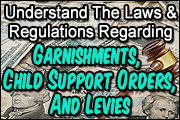Training For Kansas Garnishment Law Requirements
Training For Kansas Garnishment Law Requirements
 What Is A Garnishment?
What Is A Garnishment?A wage garnishment is any legal or equitable procedure through which some portion of a person's earnings is required to be withheld by an employer for the payment of a debt.
The six basic types of garnishments are child support, federal, state, or local levies, creditor garnishments, and student loans, with the largest amount of garnishments being for child support.
Employer Guidelines For Handling GarnishmentsEmployers generally have to notify the debtor in writing that a wage garnishment is about to start before making a garnishment and sending payments to the creditor. The wage garnishment then typically continues until the debts are paid off or otherwise resolved. Employers are required to provide employees with a copy of garnishment paperwork.
With regard to child support garnishments, all states are required to use the "Order/Notice To Withhold Income For Child Support" notice for Child Support. This notice is designed to provide employers with key information so that they do not have to decipher unfamiliar orders/notices from different states. Click
here for details on this notice, including steps to process this notice.
Employers should note that they cannot contest the income-withholding order; however, the employer should contact the issuing agency if unable to implement the withholding either because the individual named in the order is not an employee or a withholding is already in place for the child and employee. Additionally, employers should note that states often have varying garnishment rules, so they should be sure to know the payroll wage garnishments rules for the state(s) in which it does business.
Kansas Wage Garnishment Rules
Employers should be aware that there are two general types of garnishments, one for child support and one for creditors (commonly referred to as "levies").
Re child support orders, the maximum amount that can be withheld runs between 50 (if the employee is supporting another spouse and/or children) and 65% (if the employee is not supporting another spouse and/or children and is at least 12 weeks in arrears in making support payments).
Re levies, Kansas law follows federal law in determining the amount of disposable earnings exempt from a garnishment order. The maximum that employers can withhold is the lesser of 25% of disposable earnings or the amount by which weekly disposable earnings exceed 30 times the federal minimum wage.
Wages, salary, commissions, and bonuses are all subject to withholding. Disposable earnings are the part of the earnings remaining after deductions required by law. The following are exempt from garnishment:
- Workers' compensation benefits
- Unemployment benefits
- Pension, annuity, retirement, disability, or death benefits
- Public assistance benefits
Recommended Garnishment Training Courses:
Find Seminars, Webinars, And Online Training In Your Area
Contact Info For Kansas Garnishments Law
785-296-3909
References and DisclaimersThis information is based on a variety of state laws and regulations, and is subject to change. The PayrollTrainingCenter makes every effort to make sure this information is current and accurate, however, the PayrollTrainingCenter is not engaged in rendering legal or professional advice and shall not be held responsible for any inaccuracies contained herein.


 What Is A Garnishment?
What Is A Garnishment?